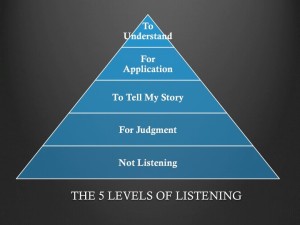Say What?

By Dr. Heidi Petak
Director(Strategy),
Global Listening Centre.
“Amazing, simply amazing. Melt-in-your mouth. Your mama was a keeper.” Beth watched her dad’s mouth move, describing the delectable German chocolate cakes her mom used to bake, but all she could think was, “He’s a diabetic! He should not be talking about mom’s cakes. He’s only making it harder for himself.”
Beth didn’t know it, but she wasn’t really listening. At least, not in the best possible sense of the word.

Executive coaches, such as Peg Allen with Hippo Solutions, teaches that there are actually five levels of listening. The first level is “Not Listening.” At this level, we have our fingers in our ears and our eyes closed, repeating “La, la, la, la, la…” We cannot hear the other person at all.
If you’ve ever been on the other end, trying to talk to a person with his fingers in his ears, you know it’s absolutely infuriating. We are left misunderstood, unable to clarify, with no sense of value to our voice.
When we listen at the second level, we are “Listening for Judgment.” This is Beth’s level, judging her dad’s words. At this level, we are so preoccupied with our own thoughts, evaluating what the other person is saying, that we can’t actually hear the meaning behind the words. This preoccupation hinders our ability to connect with the other person on a heart level.
At the third stage we are “Listening to Tell Our Story.” Instead of actually focusing on the other person’s story, we are thinking of how our own story relates to her story. We are listening for a break, a pause, a moment when we can interject.
The second level is “Listening for Application.” When we listen for how we can learn from the information or apply it to our own lives in some way, we really are listening intently because we are motivated by the usefulness of the information. Yet, we still aren’t listening at the highest level.
At the top of the pyramidwe begin “Listening to understand.”We are truly present, focused on the other person instead of ourselves, and we want to understand for their sake, not our sake. I believe at this level our listening is motivated by love. And,as the other person feels heard, understood, and known by our attentive listening, he or she experiences being loved.
With the swirl of activities, responsibilities, twitter feeds and random thoughts, choosing to listen to understand is extremely challenging. It takes work and intentionality. But when we listen for the heart behind the words and respond in a way that communicates we understand, our relationship with the other person is deepened and trust drives deep roots.
“Wait, did you say ‘Your mama was a keeper?’ Beth asked her father. He nodded, “She sure was.” Beth thought for a moment, and then asked, “Are you missing her today?” He nodded again, tears in his eyes. “I miss her every day.” Beth reached out and hugged him. He hugged her back. And she finally understood.
